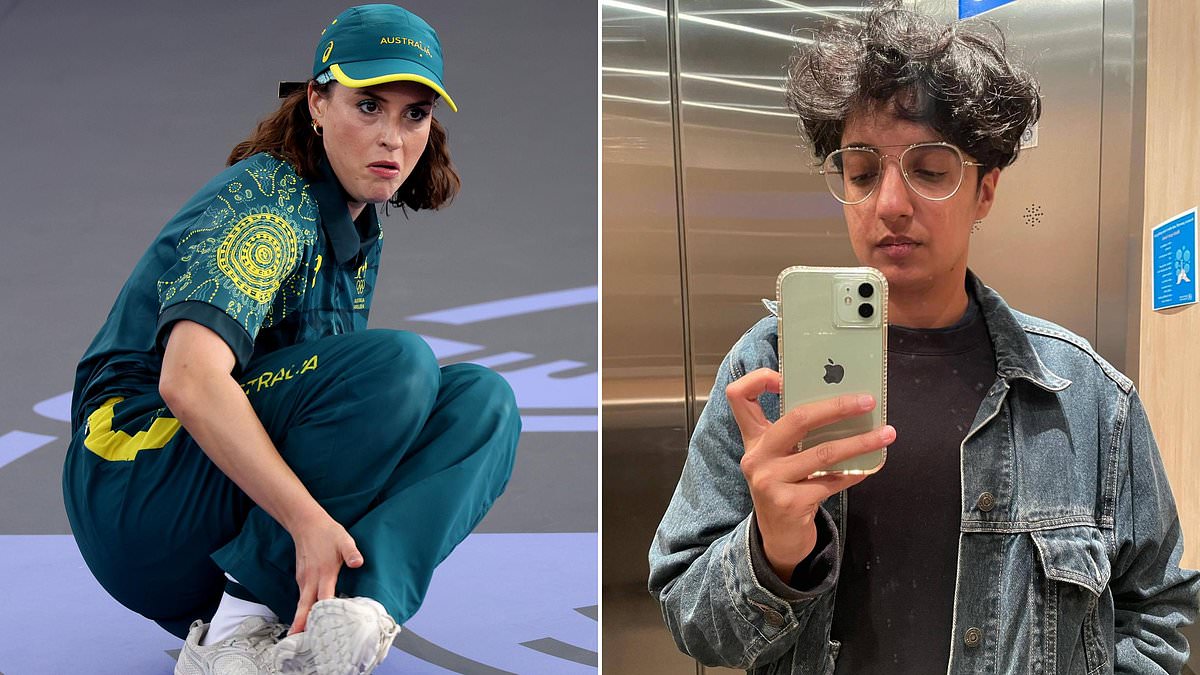A political activist has called out Olympic breakdancer Rachael Gunn and claimed her selection represents a culture of ‘whiteness’ in n sports.
Ms Gunn, also known as Raygun, became an international viral figure after she took to the stage at the Paris Olympics on Saturday with a performance that failed to score a single point from the judges.
While many Aussies, including Prime Minister Anthony Albanese, backed Raygun for her ‘have a go’ attitude, others were left fuming by her low-scoring and sometimes bizarre performance, which included kangaroo hops.
Many asked about the qualification process and how Ms Gunn had managed to advance so far despite her ability being noticeably lower than that of the other competitors in Paris.
Neha Madhok, the co-founder and former CEO of the political advocacy group Democracy in Colour, claimed that Raygun’s selection was a reflection of the ‘whiteness’ of n sports culture.
‘There are incredible dancers in places like Western Sydney (just one example) where black and brown people are honing their skills and their craft in arenas not recognised by establishment institutions,’ Ms Madhok wrote on social media.
‘This is a reflection on the whiteness of n sport, and of n attitudes.
‘We could have sent incredible people, the talent is absolutely there, but you have to go to where people are.

An Aussie activist has taken aim at Aussie Olympic cult hero, Rachael Gunn (pictured), after failing to score a single point during three breakdancing battles

The activist, Neha Madhok (pictured), claimed that Ms Gunn’s selection to represent is a ‘reflection on the whiteness of n sport’
Read More
BREAKING NEWS
Raygun does another breaking routine as Aussie Olympic stars treat her like a cult hero

‘It’s such a shame that once again, sends a mediocre white person to represent us on the global stage because we cbf finding the real talent amongst First Nations people and PoC.’
Raygun, who is a lecturer at Macquarie University, published a doctoral thesis entitled ‘Deterritorialising Gender in Sydney’s Breakdancing Scene: A B-girl’s Experience of B-boying’.
The thesis questioned why so few female participants were part of the male-dominated scene but spoke of the sport as a ‘space that embraces difference’.
However, Ms Madhok – whose former lobby group was dedicated to ‘building the power of people of colour’ – did not appear to be impressed with Raygun’s academic work.
‘What the world needs to understand is that Raygun represents a very specific and uniquely n white woman in academia,’ Ms Madhok said.
‘One who is so intent on “decolonising” that she’s done a full loop back round to colonising again.’
Ms Gunn hopped like a kangaroo, yawned at an opponent and performed the sprinkler, but failed to score a single point across her three heats.

Ms Gunn’s performance polarised viewers worldwide, with many critiquing her avant-garde dance moves which included hopping like and kangaroo (pictured)
While a more classic style of breakdancing led to her win the Oceania Championship, Ms Gunn said she had to set herself apart at the Olympics.
‘I was never going to beat these girls on what they do best, the dynamic and the power moves,’ Ms Gunn said after her event.
‘So I wanted to move differently, be artistic and creative because how many chances do you get in a lifetime to do that on an international stage.’
While the performance and social media storm initially saw Raygun retreat from the spotlight, she joined her fellow Olympians at Sunday’s closing ceremony.
Her teammates loudly cheered as the breakdancer revisited her iconic moves while lifted onto the shoulders of Aussie rower Angus Widdicombe.
Back home, Prime Minister Anthony Albanese commended Gunn when asked about criticism of her routine.
‘Raygun had a crack, good on her, and a big shout out to her,’ he told reporters in Adelaide on Sunday.
‘That is in the n tradition of people having a go. She’s had a go representing our country, and that’s a good thing.
‘Whether they’ve won gold medals or just done their best, that’s all we asked for. It’s the participating that is really important.’
